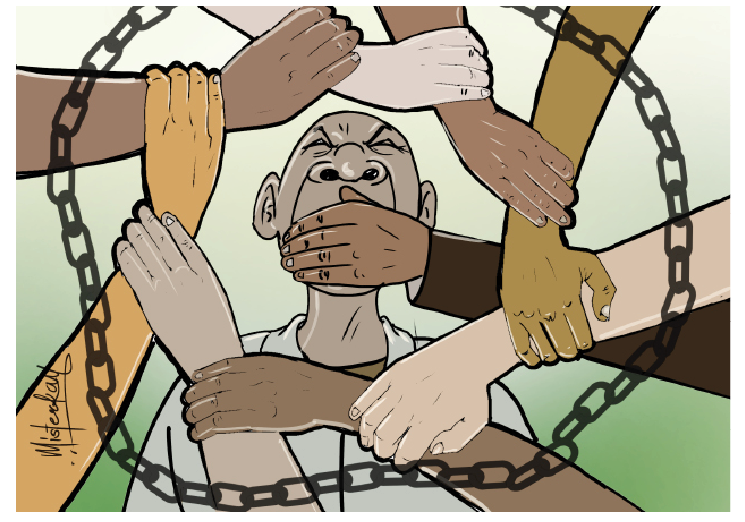Over the last decade, Nigeria has witnessed increasing restrictions on freedoms of speech, assembly, and association, which are fundamental to democratic participation. This development has been a concern as the Nigerian government has introduced various policies and actions that limit the ability of civil society, media, and activists to operate freely in their role as the third sector of society distinct from government and business.
There have been both direct and indirect crackdowns on protests and assemblies including protest suppression with the #EndSARS protests in 2020, where Nigerian youth organized nationwide demonstrations against police brutality judged to be one of the most prominent instances of shrinking civic space and crackdown against dissent. The government’s response involved deploying security forces, who used excessive force, including the tragic shooting at Lekki Toll Gate, Lagos. Nothing much has changed since then.
Citizen protests are often met with violence by security forces, deterring citizens from organizing or participating in future protests. Police and military responses have been increasingly aggressive, violating the right to peaceful assembly. Independent media outlets and journalists face harassment, arrest, and intimidation for reporting on corruption, human rights abuses, or government failures all restricting freedom of expression. There are multiple cases where journalists have been detained for their investigative reporting while policies, regulations and codes of conduct seek to restrict the civic space.
The Cybercrime Act (2015) for example is often used to criminalize online expression, especially on social media. Bloggers, activists, and citizens have been arrested under its provisions for criticizing the government online. In 2021, the proposed Social Media Regulation Act by the Nigerian government temporarily banned Twitter after it deleted a tweet by President Muhammadu Buhari. The government has since been advocating for regulations that could restrict freedom of speech on social media platforms.
Not wanting to be left behind, the legislature has also attempted several times to control civil society with the NGO Regulation Bill. This bill, introduced in 2017, aimed to regulate and monitor civil society organizations (CSOs) in Nigeria. Although it was not passed, the attempt signalled the government’s desire to control civil society activities, which are often critical of government policies and actions. Several iterations of the proposed bill by legislators later, activists fear they may not have heard the last on this.
Over Regulation?
A recent desk study referenced over 20 different agencies, policies, rules and regulations governing the civic space alone in Nigeria. The latest to join the fray is the Non-Profit Governance Code (NFPGC) 2023, proposed by the Financial Reporting Council of Nigeria (FRCN), which seeks to further regulate the non-profit sector, focusing on areas such as board composition, board responsibilities, financial management, and stakeholder engagement.
The NFPGC 2023 is a regulatory framework designed to guide the governance, accountability, and transparency of non-profit organizations (NPOs) in Nigeria. As part of ongoing efforts to promote good governance and strengthen the non-profit sector, the NFPGC aims to create a structured environment for non-profits to operate while ensuring compliance with laws, ethical standards, and best practices. The Code aims to enhance public trust and confidence among key stakeholders— citizens, beneficiaries, donors, volunteers, and the public—by promoting transparency, accountability, and good governance within the sector.
However, according to a position paper and press statement by Spaces for Change (S4C) – a Nigeria-based nonprofit organization – this new Code raises significant concerns about overregulation, as existing legislation, particularly the Companies and Allied Matters Act (CAMA) 2020, already addresses many of the issues in the proposed NFPGC 2023. This only serves as an unnecessary additional layer of regulation of the non-profit sector in Nigeria, potentially leading to what could be described as regulatory overkill.
The position paper further states that the non-profit sector in Nigeria operates under a complex regulatory framework involving multiple agencies, each responsible for different aspects of nonprofit operations. The Corporate Affairs Commission (CAC) plays a central role in the registration, management, and governance of nonprofit organizations (NPOs), ensuring compliance with statutory requirements under the Companies and Allied Matters Act (CAMA). The Special Control Unit Against Money Laundering (SCUML) monitors financial transactions to prevent money laundering and terrorist financing, while the Federal Inland Revenue Service (FIRS) ensures that NPOs adhere to applicable tax laws. Additionally, agencies such as the Industrial Training Fund (ITF), the National Social Insurance Trust Fund (NSITF), and the Pension Commission (PenCom) impose further obligations related to employee training, social insurance, and pension schemes.
A Threatened Space
Civil society organisations and actors face multiple threats in the deployment of their work, including the reports of increasing government surveillance of civil society actors, journalists, and political dissidents, particularly through digital monitoring. Laws like the Cybercrime Act and the Protection from Internet Falsehoods and Manipulation Bill (often called the “Social Media Bill”) pose significant threats to digital rights, limiting online activism and free expression.
Human rights defenders face significant threats, including arbitrary arrests, intimidation, and violence. Many activists report being harassed by security forces, and some have been forced into exile due to these pressures. Sadly, the judiciary, which should be a guardian of civil liberties, is often weakened by political interference. High-profile cases involving political dissidents, journalists, and activists have been delayed or dismissed without adequate justification.
Additionally, there is often a lack of accountability for security forces involved in human rights abuses, further emboldening authorities to use force against civic actors. While the legal and regulatory frameworks guiding the existence of CSOs are welcome, S4C recommends synergy among government ministries and agencies like the Corporate Affairs Commission (CAC), Special Control Unit against Money Laundering (SCUML), and Nigerian Financial Intelligence Unit (NFIU); streamlining existing regulations rather than introducing new ones and encouraging self-regulation which is considered a global best practice. Anything else is an overkill and will only overwhelm Not-for-Profit organisations with multiple layers of compliance demands
The closing civic space in Nigeria threatens democratic governance, human rights, and the ability of citizens to hold their government accountable. Addressing these issues requires a strong commitment to upholding constitutional freedoms, ensuring accountability for abuses by security forces, and fostering an open environment for civil society to thrive. The Nigerian government, civil society, and international stakeholders must engage in dialogue to prevent further deterioration of the civic space.
A Word of Caution
Civil society plays a critical role in promoting democracy, accountability, justice, and social cohesion. It is the oxygen that democracy breathes. In the words of Madeleine Albright, “A healthy civil society is the cornerstone of democracy, and democracy is impossible without a vibrant civil society.”
It might appear expedient to churn out different laws, policies and rules to regulate civil society now, but those in power should remember that stifling the sector always comes back to haunt everyone. Countries who have walked this path should serve as a lesson for others. Every layer of regulations, rules and policies only creates additional burdens for organisation to focus on rather than their primary mandate.
Civil society represents the voice of the people, and they hold institutions and leaders accountable. Kofi Annan once said “Civil society is the sum of all forces that emerge in society and influence governance. It is the people’s voice, the conscience of the nation, and the safeguard of democracy.”
Existing regulatory frameworks can be expanded, and laws can be amended to accommodate additional regulatory requirements. The Non-Profit Governance Code (NFPGC) 2023 is unnecessary at this time because the current regulatory landscape for Not-For-Profits is sufficient and extensive.





